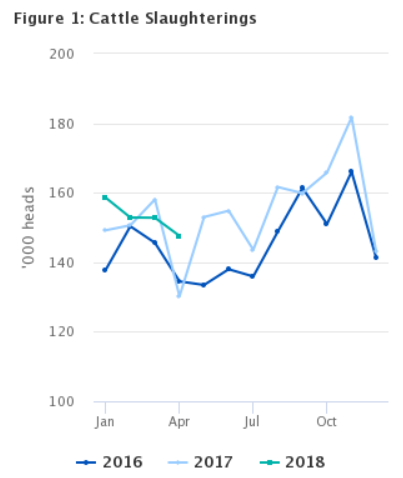The number of cattle slaughtered in April 2018 increased by 13.3% when compared to April 2017, according to the Central Statistics Office (CSO).
The CSO has reported mixed results for livestock slaughterings in general for last month, noting a decline in sheep kills but a sharp rise for both cattle and pigs.
A further comparison of April 2018 and April 2017 slaughtering figures, carried out by the office, gives the breakdown.
- Sheep slaughterings decreased by 3.3%;
- Pig slaughterings increased by 11%.
In numeric terms, the stats office reveals that 147,000 cattle were slaughtered in April 2018, along with 218,100 sheep and 283,700 pigs.
This compares with April 2017 slaughter figures amounting to: 130,200 cattle; 225,500 sheep; and 255,500 pigs.
The CSO also conducted a comparison of figures for January to April 2018 with the corresponding period of 2017.
Increases were recorded across the board for the first four months of this year.
- Cattle slaughterings increased by 4.0%;
- Sheep slaughterings increased by 3.2%;
- Pig slaughterings increased by 5.8%.
UK livestock farmers push for frictionless trade post-Brexit
Meanwhile, across the water, livestock farmers in the UK have made their feelings clear on the issue of post-Brexit trade with the EU amid ongoing uncertainty regarding Government policy once the UK departs the union.
Livestock representatives from farming unions in all parts of the UK attended a meeting in Edinburgh last week, hosted by National Farmers’ Union (NFU) Scotland, with Brexit to the fore in discussions.
Farmer representatives from the Ulster Farmers’ Union (UFU), NFU, NFU Cymru and NFU Scotland discussed the matter.
At the meeting the four organisations agreed that there had been concerning media reports over the possibility of the UK market being opened up to low-standard imports from outside Europe, should the Government not recognise the sensitive nature of beef and lamb.

